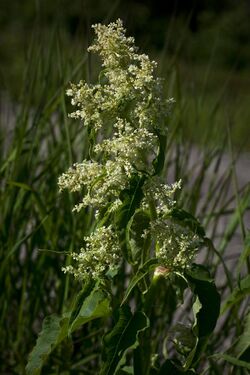Biology:Koenigia alaskana
| Koenigia alaskana | |
|---|---|

| |
| Scientific classification | |
| Kingdom: | Plantae |
| Clade: | Tracheophytes |
| Clade: | Angiosperms |
| Clade: | Eudicots |
| Order: | Caryophyllales |
| Family: | Polygonaceae |
| Genus: | Koenigia |
| Species: | K. alaskana
|
| Binomial name | |
| Koenigia alaskana | |
| Synonyms[1] | |
| |
Koenigia alaskana (synonym Aconogonon alaskanum, Persicaria alpina) is an Asian and North American species of flowering plant in the buckwheat family known by the common names Alaska wild-rhubarb and alpine knotweed.[2]
Description
This herbaceous or semi-evergreen[2] perennial grows up to 2 meters (almost 7 feet) tall, with a woody root and lanceolate leaves. The abundant flowers are white, cream or pale green, borne in plumes in midsummer.[3] They are followed by pinkish seed-heads later in summer or in early autumn. However, in a garden setting they are usually cut back after flowering to preserve vigour.[2]
Distribution and habitat
Koenigia alaskana is native to Alaska, the Yukon, and Magadan Oblast in the Russian Far East.[1]
Cultivation
It is cultivated in areas with enough space for its substantial mounds of foliage. Under the name Persicaria alpina it has received the Royal Horticultural Society's Award of Garden Merit.[2]
References
- ↑ 1.0 1.1 1.2 "Koenigia alaskana (Small) T.M.Schust. & Reveal". Plants of the World Online. Royal Botanic Gardens, Kew. https://powo.science.kew.org/taxon/urn:lsid:ipni.org:names:77152586-1.
- ↑ 2.0 2.1 2.2 2.3 "Persicaria alpina". Royal Horticultural Society. https://www.rhs.org.uk/Plants/74798/Persicaria-alpina/Details.
- ↑ Flora of North America, Aconogonon alaskanum (Small) Soják, 1974. Alaska wild-rhubarb
Wikidata ☰ {{{from}}} entry
 |

